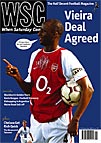 David Beckham wasn’t England’s only footballing export this summer. Neville Hadsley looks at why Jay Bothroyd has attracted both scorn at Coventry and a transfer to Perugia
David Beckham wasn’t England’s only footballing export this summer. Neville Hadsley looks at why Jay Bothroyd has attracted both scorn at Coventry and a transfer to Perugia
When Jay Bothroyd left Coventry City for Serie A side Perugia, he was, perhaps understandably, magnanimous. “I will miss Coventry,” he wrote on his personal website. “I hope the club get promoted this season because the Coventry fans really deserve Premiership football. The support at the club both home and away is fantastic.”
It sounds like your usual endearing love-in between an affectionate fan-base and a player grateful to be on his way to better things. The only difference is any affection in this case is entirely one-way. Bothroyd was given a torrid time by a large section of the Sky Blue support who regularly subjected him to abuse during the game and on the local post-match phone-in.
His manager, Gary McAllister, also did little to conceal his distaste for the striker and, despite the fact that he was his top scorer, would often prefer to field a loan signing. When the season was over it was no surprise that Bothroyd was on the manager’s list of unwanted players.
But within weeks Bothroyd had joined Perugia. So how is it that a striker so plainly rejected in the Nationwide First Division can land a three-year contract with a side in one of the most glamorous leagues in the world? For one thing, Perugia seem to be keen on a gamble – they signed Colonel Gadaffi’s son in the same week and are now talking about fielding a female player in Serie A. But it also must be said that Bothroyd is talented – even his harshest critic at Highfield Road would concede that. He has a level of skill you rarely see in the First Division.
His two goals against Stoke City at the Britannia Stadium last December, for example, were sublime and he is capable of delicate skill and creativity if the mood takes him. The problem for the Sky Blue faithful was that the mood did not seem to take him often enough and their collectively vented frustration contributed to a collapse of confidence that reduced his game to a wreck. By the end of the season he could hardly pass the ball ten feet without giving it away.
Looking back on it, few took into account how young Bothroyd was. When he played his last game for City he was still not 21. Bothroyd arrived at Highfield Road from Arsenal as an 18-year-old. He left Highbury following a touchline tantrum and, having impressed against Coventry in the 2000 FA Youth Cup final, was snapped up by then manager Gordon Strachan.
Tall and built like a particularly limp piece of string, Bothroyd had a languid, laid-back playing style which ultimately contributed to his exit. One problem was that Bothroyd did not seem to relish chasing lost causes, a basic requirement for some football fans. Many want to see their players scurry like demented hares whenever there’s a back-pass, even when there is no hope of getting even a sniff of the ball. It’s an unspoken pact: we know it doesn’t do any good, but we want to see you do it anyway, just to show you care.
If chasing lost causes makes a great striker, Lee Hughes would be playing for England. Hughes cost the Sky Blues £6.5 million – more than six times the fee Coventry paid Arsenal for Bothroyd – and in 36 starts managed just ten goals from open play.
Bothroyd scored 11 from 27 starts in 2002-03 but never got the terrace support Hughes did. No one chanted his name. Even though Bothroyd was in almost every way a better footballer, he was far less popular. Hughes did not give the ball away as much as Bothroyd because he was less inclined to do anything with it. Bothroyd appeared more lackadaisical because he was too easily tempted into trying the spectacular.
And so supporters who over the years had idolised many unpredictable and wayward talents – Tommy Hutchison, Dave Bennett, Darren Huckerby, Robbie Keane, to name a few – were glad to see the back of Bothroyd.
In his Perugia debut – admittedly against a non-league side – Bothroyd scored a hat-trick before half-time. If the Italians’ reputation as lovers of style holds true, they may well take to the gangly, laid-back English kid. But ultimately he was just too weird for us.
From WSC 199 September 2003. What was happening this month